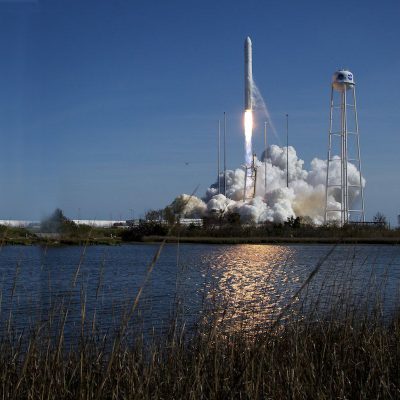About LambdaVision
LambdaVision is designing and developing an innovative, protein-based artificial retina that utilizes a light-activated protein, bacteriorhodopsin, to restore functional sight to those who would otherwise be blind due to retinal degenerative diseases, including age-related macular degeneration (AMD) and retinitis pigmentosa (RP). No cure exists for these diseases, and currently available treatments only slow their progression. There is a significant unmet need for the development of a treatment that restores meaningful vision to those affected. Through the development of an artificial retina, LambdaVision hopes to one day help patients regain vision so that they can complete everyday tasks with independence.
LambdaVision was founded by a group of researchers led by Dr. Robert R. Birge, a distinguished professor of chemistry at UConn and a pioneer in the field of light-sensitive proteins.

LEADERSHIP
Management Team

Nicole L. Wagner, PhD
President and Chief Executive Officer

Jordan A. Greco, PhD
Chief Scientific Officer

Robert R. Birge, PhD
Founder
Board of Directors

Nicole L. Wagner, PhD
President and Chief Executive Officer

Robert R. Birge, PhD
Founder

Susan Froshauer, PhD
Vice President, CURE Collaborations, LLC

Kirk Dornbush, JD
COO and Co-Founder, Coagulant Therapeutics, Inc.

Cynthia Green
Managing Director, Investments, Connecticut Innovations
PARTNERS
Currently, LambdaVision is partnering with Space Tango, with funding from NASA, to explore the benefits of microgravity for producing the artificial retina on the International Space Station U.S. National Laboratory (ISS) that is currently orbiting the Earth. This artificial retina is one of the first technologies being produced on the ISS that has potential for clinical use. While this therapy can be effectively developed in labs on Earth, producing the artificial retina in low-Earth orbit (LEO), improves the homogeneity of the alternating protein and polymer layers, resulting in increased stability, performance, and optical quality of the multi-layer system. These improvements could reduce the amount of materials required to produce the artificial retina, lower costs, and accelerate production time for future pre-clinical and clinical efforts.
LambdaVision, together with Space Tango, will carry out a series of flights to the ISS to evaluate and improve production processes, produce artificial retinas that can be used in pre-clinical, as well as early stage clinical testing, and define parameters for commercial-scale production. The company intends to initiate clinical trials within the next 3 years for the treatment of advanced RP, and following initial success in treating this rare disease, will expand to investigate the use of the product in AMD.

Resources
Business Development
Accelerator for Biosciences in CT
BioCT: Connecting Connecticut’s Bioscience Community
Connecticut Center for Entrepreneurship and Innovation
Connecticut Innovations
CTNext
Connecticut Center for Entrepreneurship and Innovation
MassChallenge
UConn Technology Incubation Program (TIP)
Financial Support
Birge Research Group (UConn)
Center for Advancement of Science in Space (CASIS)
Connecticut Center for Advanced Technology, Inc.
Connecticut Innovations
NASA
National Science Foundation
National Institutes of Health
The Refinery
Harold S. Schwenk, Sr. Distinguished Chair of Chemistry
INVESTORS
At LambdaVision, we are focused on developing the first protein based artificial retina to restore meaningful vision for patients who are blind or have lost significant sight due to advanced retinal degenerative diseases, including retinitis pigmentosa (RP) and age related macular degeneration (AMD). To date, the company has secured over $10M in funding in state, local, and government research funds.









 Dr. Nicole Wagner obtained her PhD in Molecular and Cell Biology from the University of Connecticut under the advising of Dr. Robert Birge, a pioneer in the field of light-sensitive proteins. Nicole entered the graduate program in 2007 and spent the majority of her graduate career working on optimizing retinal-containing proteins for application in devices. During the course of her PhD research, she played a critical role in the proof-of-concept experiments which helped to found LambdaVision. Through the use of site-directed mutagenesis, site-specific saturation mutagenesis, and directed evolution, Nicole was able to genetically engineer the protein, bacteriorhodopsin, for a variety of device applications, including protein-based holographic and 3-dimensional memories, a chemical detection sensor, and, most recently, a protein-based artificial retina.
Dr. Nicole Wagner obtained her PhD in Molecular and Cell Biology from the University of Connecticut under the advising of Dr. Robert Birge, a pioneer in the field of light-sensitive proteins. Nicole entered the graduate program in 2007 and spent the majority of her graduate career working on optimizing retinal-containing proteins for application in devices. During the course of her PhD research, she played a critical role in the proof-of-concept experiments which helped to found LambdaVision. Through the use of site-directed mutagenesis, site-specific saturation mutagenesis, and directed evolution, Nicole was able to genetically engineer the protein, bacteriorhodopsin, for a variety of device applications, including protein-based holographic and 3-dimensional memories, a chemical detection sensor, and, most recently, a protein-based artificial retina. Dr. Jordan Greco obtained his PhD in Physical Chemistry at the University of Connecticut. Under the direction of Dr. Robert Birge, Jordan focused his graduate thesis work primarily on the investigation of the structure and function of photoactive proteins, using both spectroscopic and quantum mechanical approaches. Much of his work has contributed toward the application of the light-activated protein, bacteriorhodopsin into photonic and biomimetic devices, such as protein-based optical memories and processors, photovoltaic cells, and the protein-based artificial retina being developed by LambdaVision.
Dr. Jordan Greco obtained his PhD in Physical Chemistry at the University of Connecticut. Under the direction of Dr. Robert Birge, Jordan focused his graduate thesis work primarily on the investigation of the structure and function of photoactive proteins, using both spectroscopic and quantum mechanical approaches. Much of his work has contributed toward the application of the light-activated protein, bacteriorhodopsin into photonic and biomimetic devices, such as protein-based optical memories and processors, photovoltaic cells, and the protein-based artificial retina being developed by LambdaVision. Dr. Robert Birge received his B.S. degree in chemistry from Yale University in 1968, his PhD in chemical physics from Wesleyan University in 1972, and was a National Institutes of Health postdoctoral fellow at Harvard University from 1973-1975. He was an Assistant and subsequently a tenured Associate Professor of Chemistry at the University of California, Riverside (1975-1984), and then served as Professor and Head of the Chemistry Department at Carnegie Mellon University (1984 – 1987). He joined the faculty at Syracuse University in 1988 where he was a University Professor of Chemistry and Physics, Director of the W. M. Keck Center for Molecular Electronics, and Research Director of the New York State Center for Advanced Technology in Computer Applications and Software Engineering. In January 2000, he joined the faculty at the University of Connecticut where he holds the Harold S. Schwenk Distinguished Chair in chemistry. He has published over 250 research papers and holds five U.S. and international patents on the use of proteins to make holographic associative memories, three-dimensional paged memories, and hybrid protein-semiconductor devices. He has served on the editorial advisory board of seven journals and was an associate Editor of Biospectroscopy. In 1997, he was listed among the fifty “Cyber Elite” by Time Digital for his work on protein-based devices, and the use of these devices for computer memories and processors. Dr. Birge won the Connecticut Innovations 2001 Annual Technology Award, the 2002 3M Award of Canada for Physical Chemistry and the 2009 Connecticut Medal of Science. Dr. Birge paved the way for the development of LambdaVision’s artificial retina and continues to be actively involved in the company.
Dr. Robert Birge received his B.S. degree in chemistry from Yale University in 1968, his PhD in chemical physics from Wesleyan University in 1972, and was a National Institutes of Health postdoctoral fellow at Harvard University from 1973-1975. He was an Assistant and subsequently a tenured Associate Professor of Chemistry at the University of California, Riverside (1975-1984), and then served as Professor and Head of the Chemistry Department at Carnegie Mellon University (1984 – 1987). He joined the faculty at Syracuse University in 1988 where he was a University Professor of Chemistry and Physics, Director of the W. M. Keck Center for Molecular Electronics, and Research Director of the New York State Center for Advanced Technology in Computer Applications and Software Engineering. In January 2000, he joined the faculty at the University of Connecticut where he holds the Harold S. Schwenk Distinguished Chair in chemistry. He has published over 250 research papers and holds five U.S. and international patents on the use of proteins to make holographic associative memories, three-dimensional paged memories, and hybrid protein-semiconductor devices. He has served on the editorial advisory board of seven journals and was an associate Editor of Biospectroscopy. In 1997, he was listed among the fifty “Cyber Elite” by Time Digital for his work on protein-based devices, and the use of these devices for computer memories and processors. Dr. Birge won the Connecticut Innovations 2001 Annual Technology Award, the 2002 3M Award of Canada for Physical Chemistry and the 2009 Connecticut Medal of Science. Dr. Birge paved the way for the development of LambdaVision’s artificial retina and continues to be actively involved in the company.
 Dr. Susan Froshauer has over thirty years of biotech and biopharmaceutical research and development experience. Most recently, Susan joined Yale Office of Cooperative Research as an Entrepreneur in Residence, returning to one of her drivers, connecting entrepreneurs to know-how, funding and approaches that ultimately identify cures to improve our quality of life. Susan also is a leader of the BioCT (“CURE”) Commons accelerator program, assisting with Thames River Innovation Places community entrepreneur outreach as part of a CTNext Innovation Places funded program, Ignite. She stepped-down from her role as President and CEO of BioCT (“CURE”) to better focus her time as a tech/biotech start-up executive and mentor, and to spend time on local community activities connected to science and policy education. Susan has been involved on multiple start-up boards, the CTNext funded group, SECT Tech, the Creative Arts Workshop and the Angel Investor Forum. Prior to BioCT, Susan was Director of the Technology Exchange Portal at the University of Connecticut’s Office of Economic Development. In this role, Susan assisted Connecticut-based entrepreneurs and organizations with initiatives that train students, create jobs and contribute to economic development. She connected ideas with business expertise, business plans with investors and industry with scholars. Until 2010, Susan served for 11 years as the founding President and CEO of Rib-X Pharmaceuticals (now Melinta), which she co-founded in New Haven in 2000. Under her leadership, Rib-X raised more than $160 million in private equity, bridge financing and government grants and started to build a pipeline of antibiotics to treat serious hospital infections. Now a public company, Melinta recently has launched its first product and has several other products on the market. Before starting Rib-X, Susan served as a member of Pfizer’s Strategic Alliance Groups where she was part of a team who created a $200 million technology investment portfolio established to transform the Pfizer global research and development strategy. She received a PhD in Microbiology and Molecular Genetics from Harvard University and a B.A. in Botany from Connecticut College. She performed post-doctoral research at Yale Medical School in the Department of Cell Biology as a Jane Coffin Child’s Fellow.
Dr. Susan Froshauer has over thirty years of biotech and biopharmaceutical research and development experience. Most recently, Susan joined Yale Office of Cooperative Research as an Entrepreneur in Residence, returning to one of her drivers, connecting entrepreneurs to know-how, funding and approaches that ultimately identify cures to improve our quality of life. Susan also is a leader of the BioCT (“CURE”) Commons accelerator program, assisting with Thames River Innovation Places community entrepreneur outreach as part of a CTNext Innovation Places funded program, Ignite. She stepped-down from her role as President and CEO of BioCT (“CURE”) to better focus her time as a tech/biotech start-up executive and mentor, and to spend time on local community activities connected to science and policy education. Susan has been involved on multiple start-up boards, the CTNext funded group, SECT Tech, the Creative Arts Workshop and the Angel Investor Forum. Prior to BioCT, Susan was Director of the Technology Exchange Portal at the University of Connecticut’s Office of Economic Development. In this role, Susan assisted Connecticut-based entrepreneurs and organizations with initiatives that train students, create jobs and contribute to economic development. She connected ideas with business expertise, business plans with investors and industry with scholars. Until 2010, Susan served for 11 years as the founding President and CEO of Rib-X Pharmaceuticals (now Melinta), which she co-founded in New Haven in 2000. Under her leadership, Rib-X raised more than $160 million in private equity, bridge financing and government grants and started to build a pipeline of antibiotics to treat serious hospital infections. Now a public company, Melinta recently has launched its first product and has several other products on the market. Before starting Rib-X, Susan served as a member of Pfizer’s Strategic Alliance Groups where she was part of a team who created a $200 million technology investment portfolio established to transform the Pfizer global research and development strategy. She received a PhD in Microbiology and Molecular Genetics from Harvard University and a B.A. in Botany from Connecticut College. She performed post-doctoral research at Yale Medical School in the Department of Cell Biology as a Jane Coffin Child’s Fellow.
 Mr. Kirk Dornbush has a biotechnology career spanning 15 years. In 2003, Kirk co-founded Iconic Therapeutics, Inc., a biopharmaceutical company focused on the development and commercialization of a new drug candidate licensed from Yale University, called ICON-1. ICON-1 is a FVIIa-based recombinant protein that targets Tissue Factor, for the treatment of a variety of diseases including wet age-related macular degeneration (wet AMD) and cancer.
Mr. Kirk Dornbush has a biotechnology career spanning 15 years. In 2003, Kirk co-founded Iconic Therapeutics, Inc., a biopharmaceutical company focused on the development and commercialization of a new drug candidate licensed from Yale University, called ICON-1. ICON-1 is a FVIIa-based recombinant protein that targets Tissue Factor, for the treatment of a variety of diseases including wet age-related macular degeneration (wet AMD) and cancer. A seasoned executive with over 24 years in biotech and big pharma with in depth expertise in collaborations, licensing, business development and raising capital. Currently working with CT Innovations and a variety of early stage companies on strategic business planning, securing venture funds, building effective teams and advisory boards to optimize and accelerate their ability to reach critical milestones.
A seasoned executive with over 24 years in biotech and big pharma with in depth expertise in collaborations, licensing, business development and raising capital. Currently working with CT Innovations and a variety of early stage companies on strategic business planning, securing venture funds, building effective teams and advisory boards to optimize and accelerate their ability to reach critical milestones.